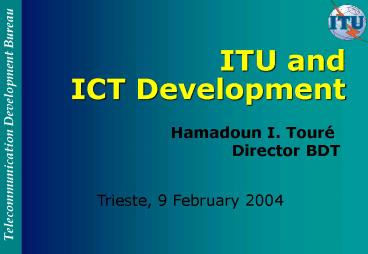ITU and ICT Development - PowerPoint PPT Presentation
Title:
ITU and ICT Development
Description:
digital broadcasting systems * implement a new working structure aimed at ... ICTs as a tool for economic and social. development and meeting the ... – PowerPoint PPT presentation
Number of Views:38
Avg rating:3.0/5.0
Title: ITU and ICT Development
1
ITU and ICT Development
Hamadoun I. Touré Director BDT
Trieste, 9 February 2004
2
ITU ICT Development
- The WSIS issues considered priorities for ITU
include - Access and connectivity
- International standardisation
- Radio frequency management
- building confidence, trust and security
- Establishing stable regulatory frameworks
(good governance) - Human capacity building
3
ITU ICT Development
- Areas in which ITU has expertise andcompetence
include - Stewardship of scarce resources (such as
spectrum and orbital resources and numbering) - promoting the concept of universality of
network services, and the development of an
effective policy and regulatory environment
- Internet Domain Name management
- performance monitoring and collection and
dissemination of statistics
4
ITU ICT Development? Activities
1. Policy regulatory reform organise
annual Global Symposium for Regulators
develop model legislation prepare case
studies and best practices prepare costing
pricing mechanisms annually prepare Trends in
Telecom Reform organise the Global
Regulators Exchange (G-REX)
5
ITU ICT Development? Activities
2. Standardisation work with other
organisations on the implementation of
initiatives that assist in bridging the
standardisation gap between developing and
developed countries.
6
ITU ICT Development? Activities
3. Legislative environment Assist
developing countries to develop model laws
for ICTs (e.g. e-applications) assist against
cybercrime, for security and data privacy
7
ITU ICT Development? Activities
4. Internet Policy and Domain Name
Management workshops on ccTLD and management
of gTLD Internet Symposium in July 2003
resulting in the Kigali Declaration
workshop on Internationalised Domain Names
and ENUM (jointly with APT) handbook on best
practices is being produced on Internet
policy
8
ITU ICT Development? Activities
5. Security X.509 ITU Recommendation and
standard for electronic authentication over
public networks the definitive reference
for designing secure applications for the
Public Key Infrastructure (PKI) provides
security guidelines to those developing new
services, including in the area of threats
and vulnerabilities over 70 recommendations
focusing on security have been published
9
ITU ICT Development? Activities
- ICT Infrastructure Developments promote the
use of most suitable technologies, including
wireless, as a way to address costs in a
timely and effective way - - particularly the case for rural and remote
areas - that have lower subscriber
density - or geographic challenges
(mountaneous terrain, large bodies of
water, or jungles)
10
ITU ICT Development? Activities
7. IMT-2000/3G mobile provide a
framework for worldwide wireless access
making use of terrestrial and/or satellite
components development of global standards to
enable systems roll-out to start worldwide
improve radio and network system global
specifications and develop frequency arrange-
ments to cope with medium and long-term
bandwidth requirements (all 3 sectors of ITU)
prepare guidelines for smooth migration (MTG)
11
ITU ICT Development? Activities
8. Next-Generation Networks (NGN) take a
leadership position in the movement to
develop NGN ITU technical recommendations
used as a basis for the convergence of
existing and new networks organise
conferences and training workshops ITU Study
Groups involved in building the technology
framework required to be able to implement NGN
12
ITU ICT Development? Activities
9. Digital Broadcasting
speed up the introduction of digital
broadcasting services for radiocommunications
as well as infocommunication study
digital TV HDTV, sound, data and multi-
media as well as transition from analogue to
digital broadcasting systems implement a new
working structure aimed at preparing
proposals on bridging the digital divide
improve presentation of web pages on ordinary
TV set screens
13
ITU ICT Development? Activities
- Other Broadband Access Technologies
- ITU is studying the various aspects
relating to wireless access system,
including frequency spectrum issues and
standardisation? http//www.itu.int/ITU-R/study-
groups/ was/index.html
14
ITU ICT Development? Activities
- Wireless Local Area Network (WLAN)
study the convergence
between IMT-2000 and WLAN-based systems
also studying the technical and operational
characteristics that could facilitate the mass
production of simple terminal equipment at
affordable prices for the worldwide provision
of high speed satellite-based Internet
services
15
ITU ICT Development? Activities
11. Human Capacity Building (Programme 5 of
IsAP)
Transfer of knowledge (high-level
training) promote the sharing of experience
and know-how strengthen Human Resources
and Training functions Disseminate
information special initiatives -
Centres of Excellence Initiative (7) -
Internet Training Centres Initiative (50) -
ITU e-Learning Centre
16
ITU ICT Development? Activities
- e-Readiness
- develop financing and economic strategies
to foster the opportunities created by
telecom development ICTs (including
guidelines and workshops) statistics and
information Regional and World Telecom
Dev. Report, production of case studies,
publications (e.g. Internet for Development,
Birth of Broadband), etc.
17
ITU ICT Development? Activities
- 13. Applications and Services
- e-Government projects, guidance in
elabo- rating technology policies at national
and regional levels e-Commerce
providing technical, policy and strategy
assistance e-Health providing assistance to
projects e-Security providing assistance
and training to developing countries
18
ITU ICT Development
- WSIS as related to ITU
- Provide ICT to all
- ICTs as a tool for economic and
socialdevelopment and meeting the Millennium
Development Goals - Confidence and security in the use of ICTs
19
ITU ICT Development CONCLUSIONS
- ITU stands to play an active role in the
implementation of WSIS action plan - in fields which it has competence
- implement activities considered core mandate of
ITU and its membership - help establish a coordination group with other
stakeholders in order to implement the WSIS
action plan? ITU would be delighted to
partner with you in any initiative that helps
developing countries bridge the digital
divide and join the Information Society































